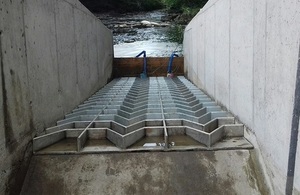Progress continues on new North East fish pass
The Environment Agency has installed 'baffles' as progress continues on a new fish pass on the River Wear.

The new 'baffles' installed at Stanhope fish pass.
New fish pass ‘baffles’ to help fish get across a barrier in the River Wear have been installed this week in a significant step forward for the new Stanhope Fish Pass.
The Environment Agency resumed work on the fish pass in June after it was postponed in November due to health and safety concerns about high river levels, and to allow for fish to spawn.
The £260,000 project at Stanhope Weir includes a Larinier fish pass to open up the river and make it easier for salmon and sea trout to move up the River Wear to spawn.
Baffles are a series of metal plates which are fixed to a sloped concrete channel – they slow the flow of the water so that fish can swim over the top of them easily.
The Environment Agency is also carrying out repairs to the weir which will improve the river flow and level monitoring capability of the Stanhope River Gauging Station.
‘Significant step forward’
Daniel Magee Project Manager for the Environment Agency, said:
It’s a significant step forward for the new fish pass to see the baffles going in – this is going to make it so much easier for fish to reach their natural spawning grounds and is good news for the River Wear.
By also improving the monitoring capabilities of the gauging station we can continue to provide an accurate and timely flood warning service to around 400 homes at risk of flooding from the River Wear.
When the work is complete it safeguards the flood warning system for the future as well as creating environmental improvements. We appreciate the community’s continued patience while this work has been ongoing.
Stanhope Gauging Station is ranked in the top 10 most important flow sites in the North East area. Opened in September 1958 it has an almost continuous record of flow data, making it one of the longest flow records in the North East area at 60 years.
Work is expected to be completed by the end of this month.